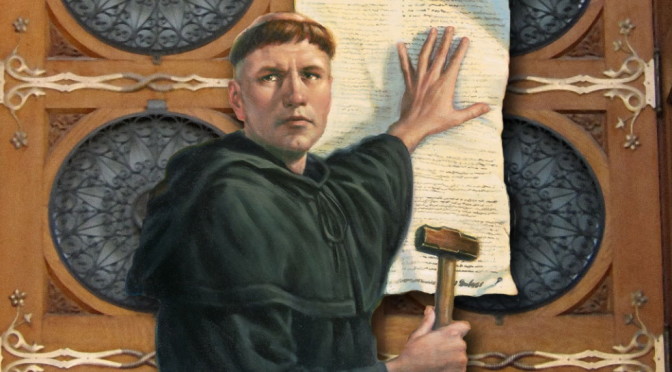In 1517 Martin Luther was provoked by Johann Tetzel to write his famous 95 Theses. In the spring of 1517, Johann Tetzel, a German friar who practiced the selling of indulgences in Germany, was preaching on indulgences in the city of Jüterbog. By selling indulgences, Tetzel and the Catholic Church gained monetary value in exchange for a believer’s future diminished time in purgatory. In other words, one’s sins would be forgiven if one were to buy these indulgences. Luther, who was a Theology professor at the University of Wittenberg, attended to Tetzel’s preaching. Luther felt disgusted by the act, and as a Theology professor he felt that he had to address this issue in a scholarly way. During the summer of 1517 Luther started to write the 95 Theses, which was not only a criticism of the selling of indulgences, but also a criticism of many of the actions and practices of the Catholic Church, particularly of its hierarchy. 1

The 95 Theses consisted of Luther challenging the teachings of the Catholic Church on the nature of penance, the authority of the pope, and the selling of indulgences. He believed that the salvation of a person’s soul should not be based on one’s monetary contribution to the church. Luther believed that faith was the only way to reach salvation and not the monetary contributions to the church. Quoting Saint Paul, Luther wrote, “The just will live by faith.”2 In the 95 Theses Luther not only criticized the Catholic Church and its corruption, but also set numerous propositions for reforming the Catholic Church. After writing the 95 Theses, on October 31, 1517, Luther decided to nail them to the door of the Wittenberg Church. After this event, the 95 Theses started to be spread throughout Europe. A year after Luther wrote the 95 Theses, they were condemned as heretical by Pope Leo X, and Luther was also excommunicated from the Catholic Church that same year.3
Martin Luther was given the chance to recant his statements against the Catholic Church at the Imperial Diet of Worms in 1521, but he refused. Luther famously said:
Unless I am convinced by the testimony of the Holy Scriptures or by evident reason—for I can believe neither pope nor councils alone, as it is clear that they have erred repeatedly and contradicted themselves—I consider myself convicted by the testimony of Holy Scripture, which is my basis; my conscience is captive to the Word of God. Thus I cannot and will not recant, because acting against one’s conscience is neither safe nor sound. God help me. Amen.4
Luther believed that salvation was reached by faith alone, and not by the works of giving money to the church, and he held to these beliefs for the rest of his life. Luther was also responsible for starting the Protestant Reformation, where a large number of Catholics decided to follow his steps by separating from the Catholic Church. Luther not only started the Protestant Reformation, but he also contributed to the so-called Catholic Reformation of the Catholic Church as well, since his 95 Theses sparked a reform movement within the Catholic Church that culminated in the Council of Trent. Even though Luther was seen as a controversial person in the Catholic Church, he contributed in significant ways to what the Catholic Church is today.5
- Encyclopedia Britannica, s.v. “Johann Tetzel.” ↵
- Romans 1:17. ↵
- Andrew Culp and Kevin Kuswa, “Signs of protest rhetoric: From Logos to logistics in Luther’s Ninety-Five Theses,” Quarterly Journal Of Speech 102, no. 2 (May 2016): 153-154. ↵
- Heiko Oberman, Luther: Man Between God and the Devil (New York: Image Books – Doubleday Press, 1992), 39. ↵
- Scott H. Hendrix, Martin Luther: Visionary Reformer (New Haven: Yale University Press, 2015), 145-150. ↵



52 comments
Cynthia Perez
The idea of having to buy your way to heaven is rather absurd, thankfully someone like Martin Luther realized this. One who understood the flaws of the Catholic Church and chose to oppose them. Highlighting the importance of internal faith rather than something more materialistic like money is much more symbolic and righteous, which is bizarre considering the church didn’t put that as their first priority. Luther, although being ostracized, still made an impact on the church not only through his 95 Theses, but in his overall desire for change.
Roberto Rodriguez
The story of Martin Luther is an inspirational one that always makes me appreciate all those that fought for their beliefs to shape the faith I believe in today. It is always crazy to think that common sense was not always common sense, it is kind of ironic that in the Bible it basically says you cannot buy your way into heaven, but those in power of the early church thought that the selling of indulgences was okay or thought that that did not apply to them. Though this article was short, it provided all the main points of the story and I appreciate that it did not try to stretch out the content, great article!
Samantha Bonillas
This article was very interesting because of how Martin Luther believed something was wrong with the Catholic church and he did something. Around the time of Martin Luther, the church believed you had to buy yourself to Heaven, which Luther believed was not the way to get to Heaven. He stood for what he believed in, which in this era, was hard to do. Well written article and very informative.
Mia Correa
While this article was very short, it still intrigued me. When I first read the title of this article, my mind went straight to Martin Luther King Jr., but once I read the first few sentences, I realized that this was not him. Despite the article not being about MLK, I noticed that they have something in common. They have the odds against them, and choose to still stand up for what they believe in.
Bianca-Rhae Jacquez
This time in catholic history is the most interesting to me. It still amazes me that Martin Luther was able to speak out and do something that no one else in his time would’ve done. Going against the catholic church wasn’t easy but he stuck to his morals. This article had a great way of translating Luthers ideals to the readers.
Alicia Guzman
What an interesting period in Catholic history. Something that I think is interesting is that I had never heard of who exactly inspired Martin Luther, beside the Catholic Church, but an actual individual and name. I also liked how the article translated and analyze the phrased coined but Luther, “faith alone”, which really speaks to why he started this religious “revolution” in the first place.
Engelbert Madrid
The Protestant Reformation were founded by the Five Solae, also known as the five principles of Protestantism: Sola Fide, Sola Gratia, Sola Christus, Sola Scriptura, Soli Deo Gloria. According to the scriptures, Martin Luther believed that the Church could not sell someone’s way to heaven; therefore, he wrote the famous 95 Thesis that were nailed on the Walls of the Church. This moment in history was important, which divided the Church.
Brianna Ford
This article was very short but overall it was well written and very informative. Martin Luther did something that others wouldn’t even dare do. He spoke on something that he believe was wrong and corrupt. I can not believe he nailed his 95 Thesis on the Walls of the Church, that just shows how determined he was to get what he had to say. Although he was excommunicated, he fought for something that was for the better and is an inspiration to all.
Marina Castro
Great article! Although it was short, it was still very informative. It is really interesting to read about Martin Luther and how he opposed to the church. It must have taken a lot of courage to do all that he did. In his time, contradicting the church was a huge deal. It is amazing to think that with a small act and huge church was going to be born.
Christopher Hohman
Nice article. To think that this ordinary man making very valid arguments would turn the world upside down. It is funny how even Luther had no idea just how important his ninety five theses were. All he was doing was calling for an address of grievances, but it became so much more. Many princes, especially in Germany, would use his words to break with Rome, and separate themselves from the Hapsburgs. Such a simple act as nailing theses to a church door tore the world apart